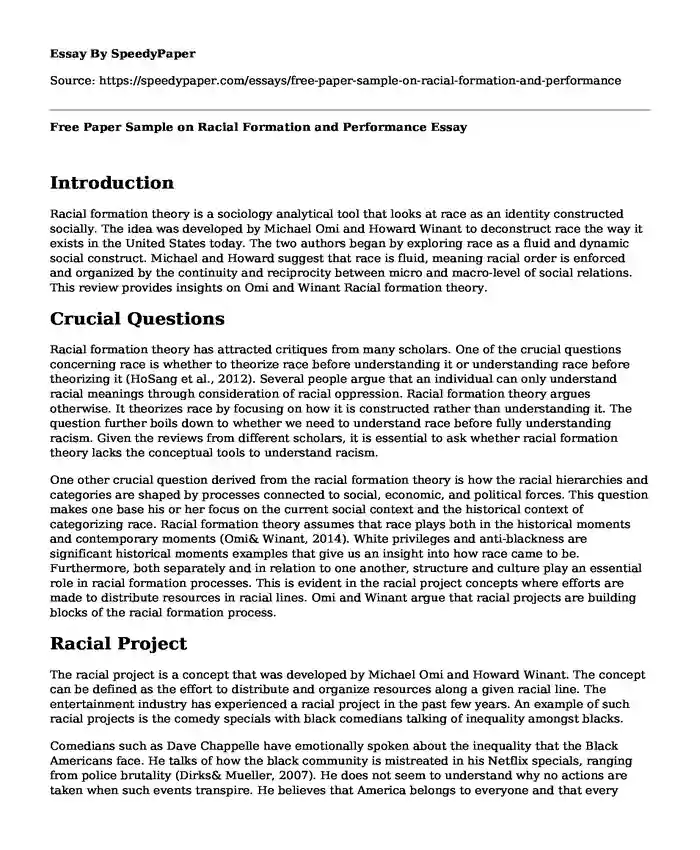
| Type of paper: | Essay |
| Categories: | Race United States Sociology Analysis |
| Pages: | 3 |
| Wordcount: | 695 words |
Introduction
Racial formation theory is a sociology analytical tool that looks at race as an identity constructed socially. The idea was developed by Michael Omi and Howard Winant to deconstruct race the way it exists in the United States today. The two authors began by exploring race as a fluid and dynamic social construct. Michael and Howard suggest that race is fluid, meaning racial order is enforced and organized by the continuity and reciprocity between micro and macro-level of social relations. This review provides insights on Omi and Winant Racial formation theory.
Crucial Questions
Racial formation theory has attracted critiques from many scholars. One of the crucial questions concerning race is whether to theorize race before understanding it or understanding race before theorizing it (HoSang et al., 2012). Several people argue that an individual can only understand racial meanings through consideration of racial oppression. Racial formation theory argues otherwise. It theorizes race by focusing on how it is constructed rather than understanding it. The question further boils down to whether we need to understand race before fully understanding racism. Given the reviews from different scholars, it is essential to ask whether racial formation theory lacks the conceptual tools to understand racism.
One other crucial question derived from the racial formation theory is how the racial hierarchies and categories are shaped by processes connected to social, economic, and political forces. This question makes one base his or her focus on the current social context and the historical context of categorizing race. Racial formation theory assumes that race plays both in the historical moments and contemporary moments (Omi& Winant, 2014). White privileges and anti-blackness are significant historical moments examples that give us an insight into how race came to be. Furthermore, both separately and in relation to one another, structure and culture play an essential role in racial formation processes. This is evident in the racial project concepts where efforts are made to distribute resources in racial lines. Omi and Winant argue that racial projects are building blocks of the racial formation process.
Racial Project
The racial project is a concept that was developed by Michael Omi and Howard Winant. The concept can be defined as the effort to distribute and organize resources along a given racial line. The entertainment industry has experienced a racial project in the past few years. An example of such racial projects is the comedy specials with black comedians talking of inequality amongst blacks.
Comedians such as Dave Chappelle have emotionally spoken about the inequality that the Black Americans face. He talks of how the black community is mistreated in his Netflix specials, ranging from police brutality (Dirks& Mueller, 2007). He does not seem to understand why no actions are taken when such events transpire. He believes that America belongs to everyone and that every individual should be treated equally despite their skin color. Chapelle, in one of his comedy sessions, educates the crowd on the history of the black people. This he does in an attempt to say that enough is enough, and the black community should rise against all the impunities against them. Comedian's actions have led to several events. The black communities have made a series of protests leading to arrests and loss of jobs to the police. Blacks have also had a taste of the Oscar Awards in different categories.
Conclusion
In conclusion, racial formation theory has been of great importance to the general population. It has given insights into how people can fight for their equality. An example is the racial project's concepts. A concept that has enabled blacks to enjoy privileges such as winning Oscar Awards, just like the whites.
References
HoSang, D., LaBennett, O., & Pulido, L. (Eds.). (2012). Racial formation in the twenty-first century. Univ of California Press.
http://winant.faculty.soc.ucsb.edu/Race_articles/O+W-final-RFRules-sendout.pdf
Dirks, D., & Mueller, J. C. (2007). Racism and popular culture. In Handbooks of the Sociology of Racial and Ethnic Relations (pp. 115-129). Springer, Boston, MA.
http://www.academia.edu/download/53491362/Pathways_to_Downward_Mobility_The_Impact_of_School.pdf#page=123
Omi, M., & Winant, H. (2014). Racial formation in the United States. Routledge.
Cite this page
Free Paper Sample on Racial Formation and Performance. (2023, Nov 24). Retrieved from https://speedypaper.com/essays/free-paper-sample-on-racial-formation-and-performance
Request Removal
If you are the original author of this essay and no longer wish to have it published on the SpeedyPaper website, please click below to request its removal:
- Statistics Essay Sample on Intercultural Communicative Competence
- Free Essay on Gender Roles in an American Culture
- Essay Sample with the Native Times Report on Same Sex Marriages
- Historical Essay Sample: Effect of the Second Revolution
- Free Essay: Withdrawal from the IRA in US
- Free Essay Example on Obedience in American Society
- Essay Example on Safety Net and Health
Popular categories




